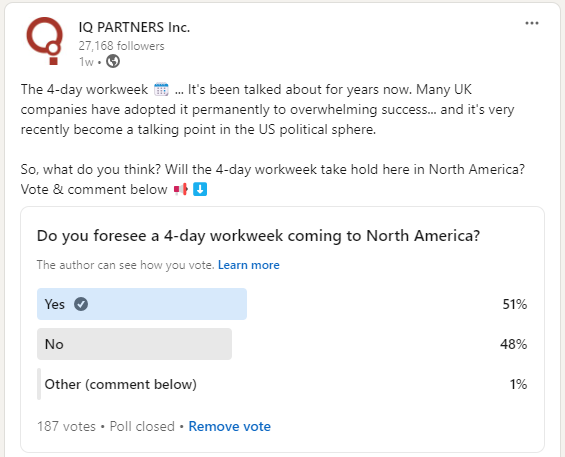The 4-day workweek has been talked about for years now. It is something that many workers have desired because of the potential benefits it presents – greater flexibility and work-life balance.
Many have advocated for it and we are already seeing it with large international companies testing it out and startups using this method as well. Many companies in the UK have adopted it permanently to overwhelming success. Now this talk has made its way to North America. The 4-day workweek has very recently become a talking point in the US political sphere.
As someone who has worked in Executive search in Toronto for years, I can tell you that conversations about a switch to a 4-day workweek are heating up in North America. There is a push for a 4-day work week. While nothing is imminent, I think a significant number of organizations will move to a 4-day work week within the next 10 years. We’re not there yet, but it’s gaining steam.

So, what do you think? Will the 4-day workweek take hold here in North America? Below we’ll discuss:
- Is a 4-day workweek viable in Canada?
- The US Bill proposing a 4-day workweek
- The results of a 4-day workweek pilot
- The results of a recent IQ PARTNERS LinkedIn poll about 4-day workweeks
Is a 4-Day Workweek Viable in Canada?
In theory, the idea of the 4-day workweek makes a lot of sense. But, is it realistic right now in Canada? Statistics Canada put together some facts and figures to put the viability of a 4-day workweek in context for Canadians:
- Canada is experiencing a significant labour shortage: Even though vacancies are falling, there were still 706,100 job vacancies in the third quarter of 2023. This is a large number of jobs to fill. When companies need to hire, they are not in a position to offer fewer hours to existing employees.
- Many people work overtime: As of July 2023, 15.5% of Canadians worked some overtime hours. This varies by industry and a large portion of these workers are in construction and manufacturing.
- 1 in 5 workers are close to retirement: 21.8% of workers age 55-59 and 44.9% of workers age 60-64 were completely or partially retired. This calls into question if there are enough younger workers to replace those who are set to retire in the coming years.
There are some challenges to the implementation of the 4-day workweek in Canada. But they can be overcome. It’s more realistic for some industries than others. And then you have to get buy-in from individual employers.
“A four-day workweek would require flexibility on the part of an employer, as well as the possibility of increasing staff numbers and wages,” Says StatsCan.
Studies have proven that it can be a successful model, but the timing of implementation also has to be right.
US Bill Proposes 4-Day Workweek
The push for a 4-day workweek is strong in the United States. Senator Bernie Sanders has proposed legislation in the Senate aimed at granting workers an additional day of rest over the weekend, reducing the standard 40-hour workweek to 32 hours.
Here is what the bill proposes:
- A reduction of the standard workweek from 40 hours to 32 hours.
- Employers would not be able to reduce employees’ pay and benefits to match their lost hours.
- Employees eligible for overtime would get paid extra for exceeding 32 hours in a week.
- Worktime reductions would be phased in over four years.
The argument for the reduction of hours revolves around extra efficiencies created by new technology, automation, and AI.
“Do we continue the trend that technology only benefits the people on top, or do we demand that these transformational changes benefit working people?” Sanders said. “And one of the benefits must be a lower workweek, a 32-hour workweek.”
However, the bill is facing still opposition. Those opposed are concerned that a reduction of hours would force companies to hire more people. It could also potentially hurt small businesses operating on thin budgets.
“It would threaten millions of small businesses operating on a razor-thin margin because they’re unable to find enough workers,” said GOP Senator Bill Cassidy of Louisiana, the ranking Republican on the committee.
“Now they’ve got the same workers, but only for three-quarters of the time. And they have to hire more”.
At the moment, there are 6 US states considering implementing a 4-day workweek – California, Massachusetts, Missouri, Pennsylvania, Texas, and Vermont.
There have also been 4 states that failed to implement it – Hawaii, Maryland, Utah, and Washington.
4-Day Workweek Pilot Program Proves It Can Work
Multiple studies have proven that the 4-day workweek can work not only in theory but also in practice. Case in point, the first-ever Canadian four-day work week pilot program with Boston College was completed in 2023. The results?
- Companies reduced hours from an average of 38 to less than 33 over 12 months.
- Companies experienced a 15% increase in revenue.
- All 41 companies in North America are planning to maintain their worktime reduction policy.
- Work-life balance increased by 35%.
- Burnout reduced by 17%.
These results are similar to the other studies that have been conducted in the UK and globally.
Which Companies Are Using a 4-Day Workweek?
There are already some companies that have switched to a 4-day week. They include Shopify, Kickstarter, and Basecamp. Amazon and Microsoft are also testing out how a shorter work week would affect their operations. Tech.co lists the companies:
- Amazon
- Basecamp
- BigLaw
- Bolt
- Buffer
- CARFAX
- Ecosia
- Forbes Advisor
- Kickstarter
- KRÜSS
- Lamborghini
- Microsoft
- Panasonic
- Samsung
- thredUp
- Toshiba
Poll Results – Do You Foresee a 4-Day Workweek Coming to North America?
We conducted a recent poll to see what you think about the viability of a 4-day workweek coming to North America. The results are split fairly even down the middle. 51% of respondents said they do foresee a 4-day workweek. 48% said they do not see it taking hold here in North America, even though there is strong evidence to support it’s a successful operations model.
Where do you stand on the issue? Do you think a 4-day workweek will be implemented by companies here in North America? Do you think it will work? As it stands today, many are still divided on the subject, which makes sense. You can easily make the case for the pros and cons of removing one work day per week.
More About The 4-Day Work Week By Our Executive Search Recruiters
Is Now the Time for a 4-Day Work Week?
Candidates Asking About a 4-Day Work Week? Trendy Friend or Fearsome Foe?






